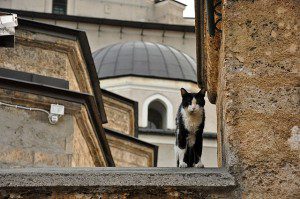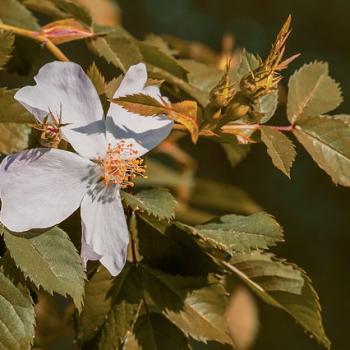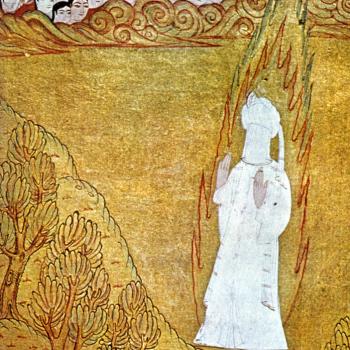
Dearest M,
Before I came to Islam, the only story I’d ever heard about you was about your cat. The story goes that she was sleeping on your prayer robe, and you cut off one of the sleeves rather than disturb her.
I wish I could say that anecdote is an example of you being portrayed positively (for once!) in my culture. It’s a wonderful illustration of your kindness and mercy to all creatures, inhabiting all the worlds – not just the human realm. Compassion was at the heart of your message. You said that giving water to a thirsty dog was enough to carry a soul to paradise, whereas being cruel to animals would take a human being to the fire instead.
Unfortunately, I have to tell you that in my culture today, we have missed the point of the story. The kind of book where someone would read this anecdote about your cat and the prayer robe would not be about you or your teachings. It would not even be about the ethics that defined traditional Islamic societies. It would be a book about cats, written for people who prefer feline to human company.
Of all our modern oddities, this must seem one of the strangest to you. Pets in my culture are called companion animals. Their function is mute accompaniment: they provide a physical presence, a warm body to touch and feed and share space with, but without the risk of emotional conflict. Animals offer unconditional love – that is what people in my culture would tell you. I’d make a small distinction. What I would say is that animals provide unconditional acceptance.
Is it the same thing as love? It may seem like something greater than the calculated exchanges of affection that make up many of our modern relationships. What we offer animals in return, however, is just the opposite. Some animals we kiss on the lips and invite to share our beds. Others we terrorize and torture, and kill in barbaric fashion. It doesn’t make any rational sense. But I have a theory.
I think that in some way, animal bodies and our bodies, i.e. what one teacher of mine called the “meat suit”, become conceptual equivalents. So we treat them similarly: coddling and indulging and feeding them on one hand and brutalizing them on the other. Is it just that we project all of our so-called animal desires on to animals, especially greed, lust and anger? At some level, I want to believe there is also a misplaced expression of something more spiritual at work: the longing to escape the prison of one’s own flesh and merge into the being of another.
This paradox of human-animal relationships has intrigued me for as long as I can remember. Whether it was my family’s own dog and cat, the horses at the riding stables up the road or the hermit crabs and fish I kept in my room as a child, all animals seemed to me in some way magical: living, breathing, beautiful mysteries. (In recent years, I was delighted to discover the Surah of the Bee in the Qur’an: here at last was acknowledgement that not only do insects have their own societies, but even their own forms of revelation!)
I think it was the quality of animal presence, the simple willingness to be, and to be with, that you understood and appreciated about our fellow creatures. Though in some of the stories you are able to intuit their suffering, like the camel that “told” you it had been overworked by its owner, I don’t think you had the same gift as Solomon, of speaking the animals’ language. It was more that your heart was so open, you could connect with the feelings of any creature. Remember when the followers were arguing about where to put your house (which was also the first mosque) in Medina, and you turned the decision over to your favorite she-camel? You knew she had an instinct for the place home ought to be.
Now: this story about the cat. The standard versions I’ve read don’t ring quite true to me. Here’s what I imagine really happened. You had a pet cat; that we know. I think she had a habit of sleeping on your clothes. Maybe one of your wives complained about it, or tried to shoo the cat off, and you interrupted with a joke. “That robe – ah, it belongs to the cat now,” I see you smiling.
Then, instead of cutting the sleeve off – something I find it hard to imagine you doing, since you had so few clothes to begin with, and you were assiduous about mending them yourself – you would have left the cat sleeping. Maybe you said you would rather cut the robe than disturb her, and borrowed one from someone else for the prayer. (And maybe the person who hastened to loan you his own robe on that occasion was the eccentric cat man himself among your retinue: Abu Hurairah, “father of the kitten”.)
I see you teaching with the cat in your lap – stroking her fur, and rubbing her whiskered cheeks. They say you admired cats for their cleanliness. I think you also appreciated their air of independence. Part of your message to all creatures (including the jinn, let’s not forget!) was to embody the dignity of the Divine creation. I understand that to mean taking care of the flesh that the soul inhabits, like the hermit crab in its shell, but not to get stuck or hide inside such a rigid form of identity. Dwelling in the joy of being alive is to sing the great song of becoming: to take wing and fly while still in the world, just as a creature as huge as a whale can leap and transcend its own element. And maybe it is by being aware of and grateful for our own beauty, and the beauty of all other creatures too, that we begin to fulfill the sacred trust of the human being as khalifa of the Divine on this Earth.
You were able to do that, my dear, but with full human consciousness and free will: to be the treasure, and to love to be known. Your message was an inspiration for all of us to make that choice for ourselves; to surrender to Allah’s overwhelming love and acceptance and give our whole being in worship in return, without holding anything back – not even so much as the sleeve of a prayer robe.
Sitting at your feet as you teach, feeling your voice in my bones,
Anna
This is the 8th of my 11 Love Letters to the Prophet Muhammad (peace and blessings be upon him)












